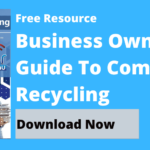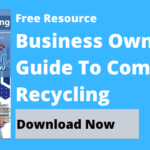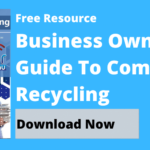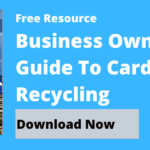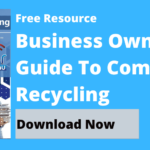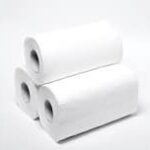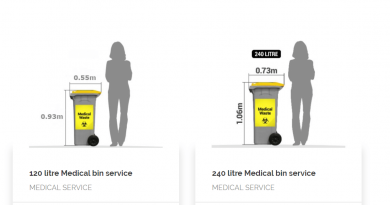What Packaging Is Recyclable? 🌱
Energy Disrupter
What Packaging Is Recyclable? 🌱
At Waster, we have really come round to the opinion that avoidance is much better than recycling when it comes to plastic. Simply not using it is so much better than any form of recycling out there.
“What packaging is recyclable?” is a really thorny question. Because, you need a degree in plastics and a real dedication to actually work it out, put it in the right bin, etc.
The problem does not end there. Just because something is in theory “recyclable” does not mean it will be recycled in this instance. For example, we covered plastic nappies recycling a while back. Indeed, plastic nappies are recyclable. The technology to recycle them exists and is proven. But for a while, no recycling technology exists to cater to them.
[embedded content]
This basically means that all nappies in Australia are going to landfill needlessly. That is correct, literally billions of nappies every year! And of course plastic pollution like this hurts our environment.
What packaging is recyclable? Prevention is so much better than cure
We covered in a recent blog why recycling is a waste of time. Much better, as a society, we basically need to stop using plastic. The negative impacts of plastic, ocean pollution, microplastics impacting wildlife, the fact it lives pretty much forever far outweigh any short term convenience we get from it.
This is particularly true when you think if the thousands of small items we use from plastic such as drinking straws, plastic bags for shopping and so on.
The easiest answer to this huge problem is to stop using plastic whenever possible! See our blog on alternatives to plastic packaging.
Obviously, the major issue is that we are addicted to the convenience of using plastic in everyday life – can we actually avoid it. Think about the push back on the seemingly easy tax on plastic bags in 2018 – with shop staff being abused!
Is there a solution to the “what packaging is recyclable?” question? Maybe compostable food packaging is!
It almost sounds too good to be true – but there is a large growth in compostable food packaging – basically what looks and feels like plastic but made from food starches – and can be disposed of in composting – i.e. whether in your garden or in an industrial composting facility. This method will see the material broken down into organic materials and hence – no actual need for recycling at all.
This sounds so good – because it means the whole plastic issue – such as the Great Pacific Garbage patch etc would never occur – or microplastics etc.
We understand that there is a huge divergence in compostable – and biodegradable etc – and do not vouch for any of the products we mention below. We argue that this is where huge money should be spent – i.e. as collected by the ever-increasing landfill levies.
As a result, we see compostable food packaging as much more sustainable than any plastic recycling programme.
Let’s check out some of the options available:
How about coffee cups? Is it recyclable packaging?
We all know that current plastic coffee cups are a nightmare to recycle – as was covered on the War On Waste TV show.
There are compostable options available – such as by Pak360.
These coffee cups even have lids made from compostable corn starch – which sounds like a great idea to me. See our blog on what it takes to be a zero-waste cafe.
However, there are real problems as covered by this article in the Sydney Morning Herald.
But, is it really compostable?
This is a bit like our question at the start, determining recyclable packaging is not that simple.
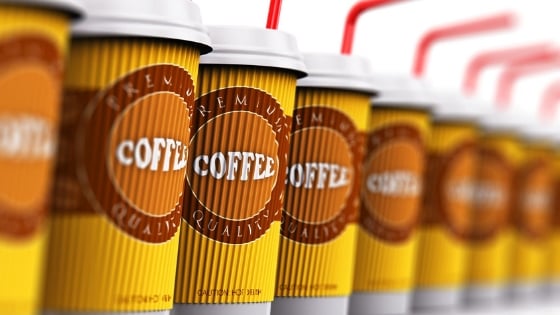
“The company’s coffee cups, which are made of paper coated with bioplastic, can technically be recycled. But many commercial facilities refuse to do so because of fears they will contaminate the recycling stream – fears BioPak says are unfounded. Technology can be installed allowing plants to separate the plastic and paper, but it is expensive and few plants in Australia have it.”
“Only seven councils in Victoria will recycle BioPak’s cups, none of them in inner Melbourne.”
“What about the backyard compost heap? BioPak’s compostable products require high temperatures – 55 degrees plus – over weeks to break down, achievable only in specialised composting centres.”
Thus we see – these items are technically compostable – though that does not mean they will be “composted”.
Our understanding is that there are new varieties of these items coming on stream that are much easier to compost.
How about plastic wrappers or cutlery?
Biopak is a company that produces lots of varieties of “compostable” packaging. See here for more details.
This covers items from bowls and trays made from sugarcane to bioplastic or wooden takeaway cutlery.
[embedded content]
How long does trash take before it completely disappears?
When we talk about what recyclable packaging, we also have to take into account the time it takes it to biodegrade, which is quite different from composting.
Composting requires a specific setting before it occurs, whereas biodegradation happens naturally.
Biodegradation is the disintegration of materials by bacteria, fungi, or other biological means. The speed at which the material breaks down is dependent on the chemical composition of the material and also where it is kept, either in the sea or the open air, etc.
When we talk about biodegradable rubbish, we are usually focused on items that will decompose in a short space of time. Will it be a few days? Weeks? How about years? Nearly all products will eventually decompose. See the table below for estimates in seawater:
| Product | Time to Biodegrade |
|---|---|
| Paper towel | 2–4 weeks |
| Newspaper | 6 weeks |
| Apple core | 2 months |
| Cardboard box | 2 months |
| Wax coated milk carton | 3 months |
| Cotton gloves | 1–5 months |
| Wool gloves | 1 year |
| Plywood | 1–3 years |
| Painted wooden sticks | 13 years |
| Plastic bags | 10–20 years |
| Tin cans | 50 years |
| Disposable diapers | 50–100 years |
| Plastic bottle | 100 years |
| Aluminium cans | 200 years |
| Glass bottles | Undetermined |
I think for common purposes, we would not regard anything as longer than one year to be bio-degradable.
Food can take longer to decompose than you may think!
If an apple falls from a tree, it will, of course, rot and decompose on the ground. However, some regular food items take quite a long time to break down.
“The time taken for food waste decomposing depends on the type of food. Normally, an orange peel takes 6 months but an apple core or a banana peel takes around one month to decompose. “
This, of course, should be taken into consideration for home composting or worm farms.
Focus on recycling, impact on the environment
When we understand that items like plastic and metal take much longer to decompose, it is clear why we need to have recycling solutions for bottles, cans, glass etc. In nearly all cases, commingled recycling is a good option for these items.
Correct treatment and recycling prevent serious issues like ocean pollution.
Biodegradable plastics?
Now, this is essentially why our recyclable packaging blog was written – because of the pestering plastics!
One development you may have seen in the press is the idea of biodegradable plastics, such as for shopping bags.
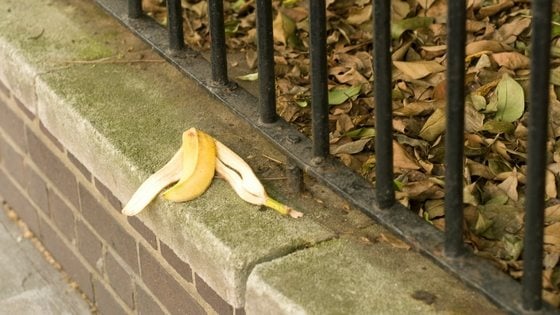

The jury is still very much out on these bags, with some articles reporting that the bags simply disintegrate into small pieces which remain as microplastics and can be even harder to deal with!
“Compostable” is a term meaning that a plastic bag will decompose in defined as “able to decompose in aerobic environments that are maintained under specific controlled temperature and humidity conditions. Compostable means capable of undergoing biological decomposition in a compost site such that the material is not visually distinguishable and breaks down into carbon dioxide, water, inorganic compounds and biomass at a rate consistent with known compostable materials. (ref: ASTM International D 6002).”
This is what you are looking for your bags and plastic.
Landfill and gases
Whether landfill is always the worst option for waste is not an easy question. As we discussed above, an apple will fall from a tree and rot on the ground. It will also decompose of course in a landfill.
The issue with landfills is that scientists explain they often produce more noxious gases due to the waste being crushed together and insufficient oxygen.
This problem can be minimised or reduced by using gas capture, which is common in modern landfills. This uses the gas to create electricity and feed the power grid, saving on fossil fuels.
Opinion on recyclable packaging
My personal belief is that we should cease using plastics wherever possible and invest heavily in organic compostable food packaging such as sugarcane-based materials.
We will then need to invest further in composting facilities or organic food waste facilities where these “fake plastic” items can break down and basically rot away.
As a result, most of our focus should be on plastic as they cause huge, long-lasting damages to both plant and sea life.
This will avoid huge issues with trying to recycle at all, which is really overvalued.
It is better to use organic compounds. Let them decay naturally and capture gases emitted for energy production or for composting.
Check out our blog here on why we should not use general waste for composting here.



